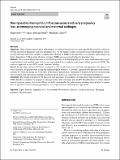Files in this item
Non-typeable Haemophilus influenzae associated early pregnancy loss : an emerging neonatal and maternal pathogen
Item metadata
| dc.contributor.author | Cevik, Muge | |
| dc.contributor.author | Moncayo-Nieto, Olga L. | |
| dc.contributor.author | Evans, Margaret J. | |
| dc.date.accessioned | 2019-09-24T12:30:03Z | |
| dc.date.available | 2019-09-24T12:30:03Z | |
| dc.date.issued | 2020-04 | |
| dc.identifier | 261126527 | |
| dc.identifier | 5fffeba3-0f9e-43e7-bc92-d444bb30117d | |
| dc.identifier | 85073990908 | |
| dc.identifier | 000521841700016 | |
| dc.identifier.citation | Cevik , M , Moncayo-Nieto , O L & Evans , M J 2020 , ' Non-typeable Haemophilus influenzae associated early pregnancy loss : an emerging neonatal and maternal pathogen ' , Infection , vol. 48 , pp. 285–288 . https://doi.org/10.1007/s15010-019-01359-6 | en |
| dc.identifier.issn | 0300-8126 | |
| dc.identifier.other | ORCID: /0000-0003-1133-3874/work/62311858 | |
| dc.identifier.uri | https://hdl.handle.net/10023/18548 | |
| dc.description.abstract | Objectives There is increasing evidence indicating an association between invasive non-typeable Haemophilus influenzae (NTHi) infection in pregnancy and early pregnancy loss. As the diagnosis relies on microbiological investigation of post-mortem placental and foetal samples, a significant proportion of NTHi-related pregnancy loss remains unrecognised. To better characterise NTHi in septic abortion, we report NTHi cases associated with early pregnancy loss. Methods We reviewed all post-mortems at <24 weeks gestation with histologically proven acute chorioamnionitis on placental histology and enrolled cases with at least one matched foetal and placental sample culture positive for NTHi. The study was approved by the NHS Lothian Caldicott Guardian. Results In our cohort, invasive NTHi has accounted for 20% of infections associated with early pregnancy loss prior to 24 weeks gestation. All patients were young and healthy pregnant women at < 20 weeks' gestation who presented with abdominal pain, PV bleed /discharge and were septic at the time of presentation. One patient with previous history of miscarriage who presented with cervical incompetence had more severe pathology suggestive of early intrauterine pneumonia. Conclusion The burden of invasive NTHi disease in early pregnancy loss is likely to be much larger than currently recognised. NTHi should be considered in pregnant women presenting with abdominal pain and PV bleed/discharge in whom clinical signs of sepsis are present. Active surveillance should be considered in this patient group including septic abortion to capture the true prevalence of this emerging pathogen to inform preventative and therapeutic approaches. | |
| dc.format.extent | 4 | |
| dc.format.extent | 1104912 | |
| dc.language.iso | eng | |
| dc.relation.ispartof | Infection | en |
| dc.subject | Septic abortion | en |
| dc.subject | Pregnancy loss | en |
| dc.subject | Non-typeable Haemophilus influenzae | en |
| dc.subject | Invasive infections | en |
| dc.subject | Emerging pathogen | en |
| dc.subject | Maternal sepsis | en |
| dc.subject | QR Microbiology | en |
| dc.subject | RG Gynecology and obstetrics | en |
| dc.subject | 3rd-NDAS | en |
| dc.subject.lcc | QR | en |
| dc.subject.lcc | RG | en |
| dc.title | Non-typeable Haemophilus influenzae associated early pregnancy loss : an emerging neonatal and maternal pathogen | en |
| dc.type | Journal article | en |
| dc.contributor.institution | University of St Andrews. School of Medicine | en |
| dc.identifier.doi | 10.1007/s15010-019-01359-6 | |
| dc.description.status | Peer reviewed | en |
This item appears in the following Collection(s)
Items in the St Andrews Research Repository are protected by copyright, with all rights reserved, unless otherwise indicated.

